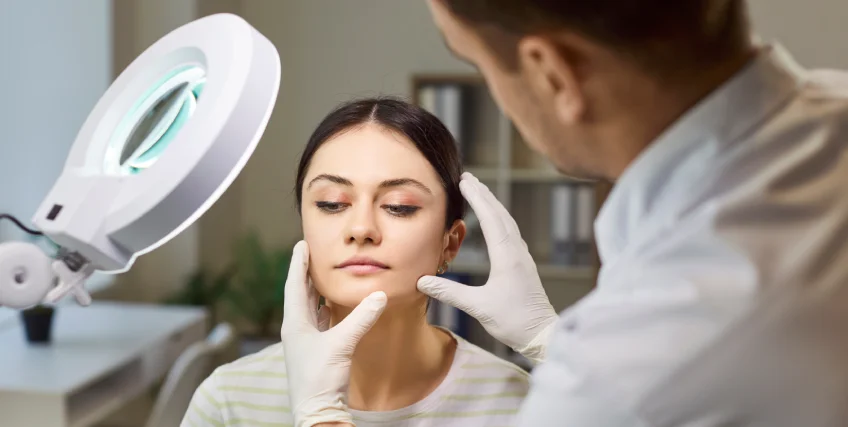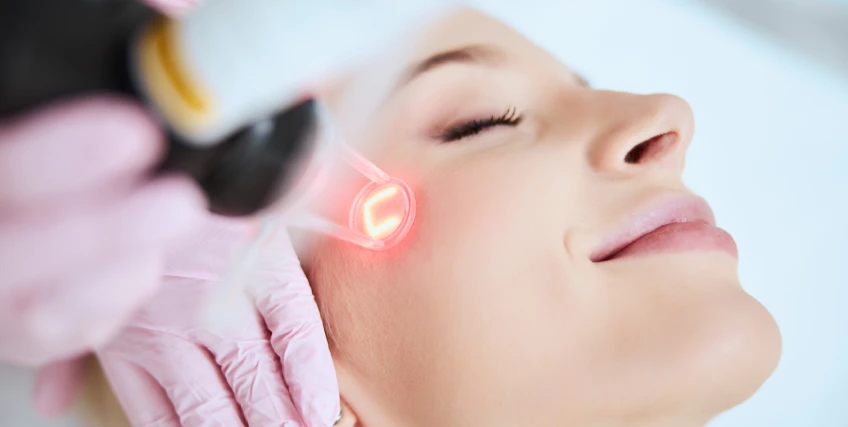The Smarter Way to Secure
Dermatology Business Loans
Looking for Business Financing?
Apply now for flexible business financing. Biz2Credit offers term loans, revenue-based financing, lines of credit, and commercial real estate loans to qualified businesses.
Set up a Biz2Credit account and apply for business financing
Dermatology is more than just skincare. It’s a growing healthcare specialty, with services ranging from acne treatments and chemical peels to skin cancer surgeries. With increasing demand, dermatology practices face rising operating costs, competitive technology upgrades, and a constant need to enhance patient experience. For small business owners in this field, access to capital is not just helpful—it's necessary.
That’s where dermatology business loans come in. Whether you're starting a new practice, expanding to a second location, or simply trying to keep up with payroll and monthly bills, having the right financing in place can help. From business operating loans to SBA loans for dermatology, there are many ways dermatologists can get financing for growth and stability. And if you want to offer financing options to patients for cosmetic procedures, working capital can support that too.
Why Dermatology Practices Need Funding
Dermatologists face a unique mix of medical and cosmetic service demands. This creates the need for constant investment in both clinical infrastructure and customer experience. Setting up a dermatology office often requires purchasing advanced diagnostic equipment, securing a licensed facility, and hiring qualified support staff. That’s a significant upfront cost.
But the spending doesn't stop there. From laser machines to updated EMR systems, ongoing upgrades are essential to stay competitive. Practices also need reliable working capital to manage seasonal cash flow dips, marketing campaigns, and unexpected repairs.
Dermatology business loans can bridge these financial gaps. They allow providers to keep operations running without delay and seize opportunities like acquiring another practice or launching a targeted social media ad campaign. Many practices also rely on business operating loans to handle routine expenses while their revenue cycles catch up.
For some, an SBA loan for dermatology route offers better repayment terms and lower interest rates. For others, flexible financing solutions like a line of credit are ideal. Either way, funding plays a critical role in building a strong dermatology business foundation.
Types of Dermatology Business Loans
Dermatology practices have multiple dermatology business loan options depending on their needs. Below are the most common loan types available to dermatologists.
Term Loan
A term loan gives you a lump sum upfront and fixed monthly payments over an agreed timeline. It works well for dermatologists planning large purchases or expansions. Whether you're buying advanced tools for skin care treatments or remodeling your clinic, this structure provides predictability.
These loans typically require a strong credit score and financial statements. But for practices with steady revenue, it's a stable option. Since repayment terms are fixed, budgeting becomes easier. Some dermatologists use term loans to consolidate existing debt and streamline cash flow. Others apply it toward buying new property or opening a second office. As long as your business plan supports the request, lenders often view it as a safe investment.
SBA Loans
SBA loans for dermatology are partially backed by the government, making them less risky for lenders. They're a strong choice for small dermatology practices needing funding with longer repayment terms and lower interest rates for qualified applicants. These loans can support everything from equipment financing to hiring staff.
The Small Business Administration doesn’t lend directly. Instead, it sets guidelines and insures the loan. To qualify, you need good personal and business credit, a solid business plan, and up-to-date tax returns. The process can take time due to detailed underwriting, but the savings can be worth it.
SBA loans are especially helpful when launching a new practice or expanding an existing clinic. Their flexibility allows dermatologists to cover almost any business cost, from marketing to commercial real estate acquisition.
Line of Credit
A line of credit gives dermatologists access to flexible capital they can draw as needed. It's like a credit card but designed for businesses. This tool helps smooth out cash flow gaps between insurance payouts, seasonal slumps, or delayed patient payments.
For instance, you can use a line of credit to cover staff salaries, restock medical supplies, or pay for unexpected maintenance. Since you only pay interest on the amount you use, it’s cost-efficient. This makes it ideal for covering short-term needs without locking yourself into a long repayment structure.
Lenders look at your credit history, existing debt, and revenue to determine your credit limit. Many dermatologists use lines of credit alongside other financing solutions to create a buffer against unpredictable expenses.
Equipment Financing
Modern dermatology relies heavily on tech-driven treatments. Whether it’s lasers, microdermabrasion tools, or skin cancer detection devices, these machines are expensive. Equipment financing allows you to get the tools you need without straining your working capital.
This loan is usually secured by the equipment itself, making it easier to qualify. Dermatologists can use it to buy, lease, or upgrade tools without massive down payments. Payments are often aligned with the expected useful life of the equipment.
It’s a great way for small business owners to stay current without tapping into cash reserves. This form of practice financing ensures that your clinic can stay competitive while spreading out costs over time.
Commercial Real Estate Loans
Looking to buy a clinic space or renovate your existing one? A commercial real estate loan helps you finance the property where your dermatology practice operates. This can be a smart move for dermatologists ready to stop renting and start building equity.
These loans often come with longer repayment terms and competitive interest rates. You'll need a strong business plan, stable revenue, and a decent credit score to qualify. Some providers even combine real estate loans with SBA support for better terms.
Owning your property also provides room for future expansion, whether that means adding more treatment rooms, a cosmetic suite, or even renting out part of the space.
How to Use Dermatology Business Loans
Once approved, how you use your dermatology business loans depends on your goals. Here are some smart applications.
Equipment Purchase
Modern tools are a must for top-tier skin care and cosmetic treatments. From laser resurfacing to mole removal, having the right equipment improves outcomes and efficiency. Dermatology business loan via equipment financing helps you invest in the latest tech without large upfront payments. These tools keep your practice competitive and enhance patient satisfaction.
Hiring and Training
Your team is your biggest asset. Whether you're hiring support staff, RNs, or dermatology specialists, costs add up. Dermatology business loans can help cover salaries, recruitment expenses, and staff training. It's especially useful when expanding to a new location or launching a start-up practice.
Marketing and Branding
From SEO to Instagram ads, getting your name out matters. You can use dermatology business loans to fund marketing, social media campaigns, and local outreach. It boosts your visibility and draws in new patients. This kind of investment has long-term payoff for brand positioning.
Working Capital Needs
Sometimes it’s about keeping the lights on. Use your funds to cover utilities, rent, restocking supplies, or bridging revenue delays. Having access to working capital can help stabilize day-to-day operations, especially during slower seasons or billing delays from insurance providers.
How to Qualify for Dermatology Business Loans
Before applying, know what lenders look for. Here’s what you’ll need to qualify.
Good Credit Score
Your credit score and credit history are key indicators of risk. A strong score improves your odds of approval and may secure better interest rates. For newer dermatologists, building personal and business credit is crucial.
Solid Business Plan
A clear business plan shows how you’ll use the funds and repay the dermatology business loan. It should outline revenue projections, target market, and your dermatology practice model. A well-written plan increases lender confidence.
Revenue History
Established clinics with steady income have a better chance of approval. Lenders like to see consistent cash flow, which proves your ability to meet monthly payments. Even start-up practices should show future revenue projections.
Low Debt-to-Income Ratio
If you already have loans or credit card debt, lenders will assess your ability to handle more. A low debt-to-income ratio shows financial stability and a reduced risk of default, which supports your eligibility.
Things to Know Before You Apply
Before applying for dermatology business loans, it helps to get your financial house in order. Lenders evaluate several key elements, and preparing in advance gives you an edge. Here are some things to keep in mind.
Review Your Credit Score
Lenders always check your credit score before approving a loan. A higher score shows financial responsibility and increases the odds of securing lower interest rates. Dermatologists with weaker credit should consider building personal and business credit before applying for large dermatology business loans.
Compare Loan Options
Not all loan programs are the same. Some offer fast funding decisions with higher rates, while others like SBA loans for dermatology may require more paperwork but offer better terms. Compare monthly payments, fees, and flexibility to see which structure aligns with your dermatology practice goals.
Know Your Numbers
Before applying for any dermatology business loans, have clear data on your cash flow, outstanding credit card balances, and business operating loans. Lenders appreciate it when borrowers know their numbers and can explain how funds will be used. It reflects solid planning and financial awareness.
Match Loans with Business Goals
Match your dermatology business loans with your short- and long-term goals. If you're buying lasers or cosmetic tools, consider equipment financing. If you need a runway while expanding, a line of credit might fit better.
What Lenders Want to See
When applying for dermatology business loans, it’s important to know what lenders expect. Meeting their criteria upfront makes the borrowing process faster and smoother.
Consistent Revenue
Lenders want to see that your dermatology practice brings in steady income. Regular billing cycles and predictable cash flow show you can handle monthly payments. Newer clinics should provide financial projections to support their case.
Positive Credit History
Your credit history tells lenders how reliably you manage debt. A clean record with timely payments on your credit card, utilities, or prior business loans helps build trust. Even minor issues should be addressed before applying.
Clear Use of Funds
Know exactly how you'll use the loan. Whether it’s for equipment financing, commercial real estate, or staffing, a specific breakdown helps in underwriting. Vague uses raise red flags.
Updated Documentation
From profit and loss statements to tax returns, licenses, and a solid business plan, have your financials ready. It saves time and proves you’re serious. Some lenders may also ask for personal credit details.
Final Thoughts
Navigating the world of dermatology business loans doesn’t have to be overwhelming. Whether you're seeking funding to start fresh or scale your operations, understanding your options makes all the difference. From SBA loans for dermatology to equipment financing or a flexible line of credit, the right solution depends on your needs and long-term goals.
Lenders want to work with practices that are prepared, focused, and financially informed. By keeping your documents in order, maintaining good credit history, and knowing how to use funds wisely, you put your dermatology practice on the path to sustainable growth.
Trusted by Thousands of Small Business Owners in America.**
Simply because we get what you go through to build a business you believe in.
**Disclaimer: All stories are real, as told by real business owners. Customers do not receive monetary compensation for telling their stories.
From One Entrepreneur to Another: We Get You
We understand what's behind building a business you believe in.
All stories are real, as told by real business owners. Customers do not receive monetary compensation for telling their stories.



Articles on Dermatology Business Loans
Using Business Loans to Hire Staff and Upgrade Technology in Dermatology
The field of dermatology is highly rewarding and can be lucrative. But success doesn’t happen overnight. It will take a lot of hard work and
A Comprehensive Guide to Financing for Dermatologists
Dermatologists require substantial investment in education, training, and getting a practice off the ground.
How to Use a Line of Credit to Manage Cash Flow in Your Dermatology Office
Managing finances in a private dermatology practice can feel like a delicate balance, just like in any medical practice.
How Much Does It Really Cost to Start a Dermatology Clinic in 2026
Starting your own dermatology clinic might seem exciting and it should be.
Frequently Asked Questions on Dermatology Business Loans
1. What are typical interest rates for dermatology business loans?
There’s no standard rate. It depends on the lender, your credit score, and the type of loan. SBA loans for dermatology may often offer lower interest rates, but approval takes time. Short-term business loans may come with higher costs. The key is matching the rate with your clinic’s cash flow capacity.
2. Can I get financing with a low credit score?
You might still get financing, but it could come with stricter terms. Some lenders will look at your business plan, revenue, and personal credit to offset the risk. If your credit history has issues, consider secured loans or smaller loan programs that help you build credibility.
3. What kind of paperwork do I need to apply?
Expect to submit financial statements, tax returns, a valid business license, and a solid business plan. If you’re applying for SBA loans for dermatology, the underwriting will likely require additional proof of income and debt levels. Having organized paperwork helps speed up the process.
4. How long does it take to get approved?
Timelines vary. Traditional bank loans and SBA loans can take weeks due to thorough checks. Quick financing solutions like a line of credit may be faster. But lenders will still evaluate your credit score, revenue, and readiness. Being prepared helps reduce wait times.
5. Is refinancing a good option for existing dermatology loans?
If you’ve built stronger revenue or improved your credit score, refinancing can lower your interest rates or stretch out repayment terms. Dermatologists often refinance to streamline monthly payments or consolidate debt. It’s a smart move if the new terms actually reduce long-term cost.
6. What if I’m just starting out with a new dermatology practice?
New providers may find it tougher to qualify for large dermatology business loans, but SBA loans for dermatology and some loan programs are geared toward start-up clinics. Lenders will look at your business plan, licensing, and any prior medical experience. Keeping overhead low and showing early traction helps improve chances.
Frequent searches leading to this page
Term Loans are made by Itria Ventures LLC or Cross River Bank, Member FDIC. This is not a deposit product. California residents: Itria Ventures LLC is licensed by the Department of Financial Protection and Innovation. Loans are made or arranged pursuant to California Financing Law License # 60DBO-35839




